

Karen Horney. Dr.
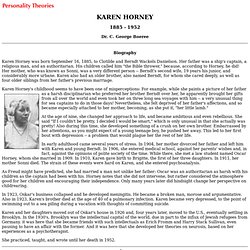
C. George Boeree Biography Karen Horney was born September 16, 1885, to Clotilde and Berndt Wackels Danielson. Her father was a ship's captain, a religious man, and an authoritarian. Karen Horney's childhood seems to have been one of misperceptions: For example, while she paints a picture of her father as a harsh disciplinarian who preferred her brother Berndt over her, he apparently brought her gifts from all over the world and even took her on three long sea voyages with him -- a very unusual thing for sea captains to do in those days!
At the age of nine, she changed her approach to life, and became ambitious and even rebellious. In early adulthood came several years of stress. As Freud might have predicted, she had married a man not unlike her father: Oscar was an authoritarian as harsh with his children as the captain had been with his. Rollo May. Dr.
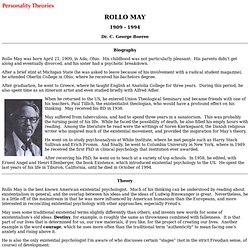
C. George Boeree Biography. Anna Freud. Dr.
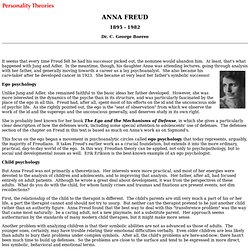
C. George Boeree It seems that every time Freud felt he had his successor picked out, the nominee would abandon him. At least, that's what happened with Jung and Adler. In the meantime, though, his daughter Anna was attending lectures, going through analysis with her father, and generally moving towards a career as a. Albert Ellis. Albert Ellis Since I began putting these personality theories on the internet, I have received requests to add this or that theorist, sometimes with the added notion that I must be a total dunderhead to have left out such a genius!
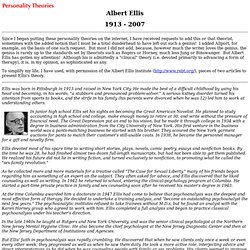
I added Allport, for example, on the basis of one such request. But most I did not add, because, however much the writer loves the genius, the genius is rarely up to the standards set by theorists such as Rogers or Horney, much less Jung or Binswanger. But Albert Ellis has gotten my attention! Although his is admittedly a "clinical" theory (i.e. devoted primarily to advancing a form of therapy), it is, in my opinion, as sophisticated as any.
Hans Eysenck. Dr.
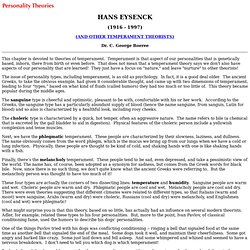
C. George Boeree. Otto Rank. Dr.
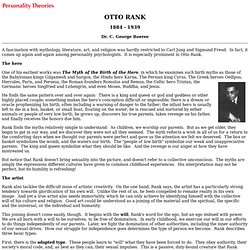
C. George Boeree A fascination with mythology, literature, art, and religion was hardly restricted to Carl Jung and Sigmund Freud. In fact, it comes up again and again among personality psychologists. Erich Fromm. Dr.
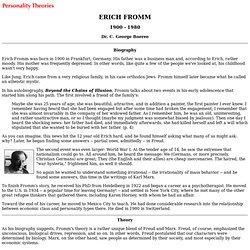
C. George Boeree Biography Erich Fromm was born in 1900 in Frankfurt, Germany. His father was a business man and, according to Erich, rather moody. Like Jung, Erich came from a very religious family, in his case orthodox Jews. In his autobiography, Beyond the Chains of Illusion, Fromm talks about two events in his early adolescence that started him along his path. Maybe she was 25 years of age; she was beautiful, attractive, and in addition a painter, the first painter I ever knew.
The second event was even larger: World War I. Nationalism could go to. So again he wanted to understand something irrational -- the irrationality of mass behavior -- and he found some answers, this time in the writings of Karl Marx. To finish Fromm's story, he received his PhD from Heidelberg in 1922 and began a career as a psychotherapist. Snygg and Combs. Albert Bandura. 1925 - present Dr.
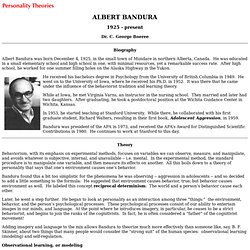
C. George Boeree Biography Albert Bandura was born December 4, 1925, in the small town of Mundare in northern Alberta, Canada. He received his bachelors degree in Psychology from the University of British Columbia in 1949. B. F. Skinner. Dr.

C. George Boeree Biography Burrhus Frederic Skinner was born March 20, 1904, in the small Pennsylvania town of Susquehanna. His father was a lawyer, and his mother a strong and intelligent housewife. Abraham Maslow. Dr.
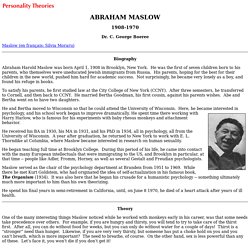
C. George Boeree Maslow (en français: Silvia Moraru) Conclusions. The Ultimate Theory of Personality Dr. C. George Boeree. Alfred Adler. Dr. C. George Boeree I would like to introduce Alfred Adler by talking about someone Adler never knew: Theodore Roosevelt. Ludwig Binswanger. Dr. C. George Boeree Woe's me, woe's me! The earth bears grain, But I Am unfruitful, Am discarded shell, Cracked, unusable, Worthless husk. Viktor Frankl. Dr. C. George BoereeShippensburg University In September of 1942, a young doctor, his new bride, his mother, father, and brother, were arrested in Vienna and taken to a concentration camp in Bohemia. It was events that occurred there and at three other camps that led the young doctor - prisoner 119,104 - to realize the significance of meaningfulness in life. One of the earliest events to drive home the point was the loss of a manuscript - his life's work - during his transfer to Auschwitz.
Another significant moment came while on a predawn march to work on laying railroad tracks: Another prisoner wondered outloud about the fate of their wives. The salvation of man is through love and in love. And throughout his ordeal, he could not help but see that, among those given a chance for survival, it was those who held on to a vision of the future -- whether it be a significant task before them, or a return to their loved ones -- that were most likely to survive their suffering. Biography Theory.
Carl Jung. George Kelly. Dr. C. George Boeree George Kelly was teaching physiological psychology at Fort Hays Kansas State College in 1931. It was the time of the dust bowl and the Depression. Recognizing the pains and sorrows of the farming families of this part of west-central Kansas, he decided to do something a little more humanitarian with his life: He decided to develop a rural clinical service. Carl Rogers. Erik Erikson. Gordon Allport. Piaget. Personality Theories. Medard Boss. Sigmund Freud. Dr. C. George Boeree It is a mistake to believe that a science consists in nothing but conclusively proved propositions, and it is unjust to demand that it should.
It is a demand only made by those who feel a craving for authority in some form and a need to replace the religious catechism by something else, even if it be a scientific one. Science in its catechism has but few apodictic precepts; it consists mainly of statements which it has developed to varying degrees of probability.